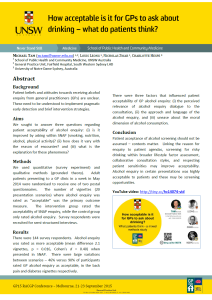 This oral presentation was given at the GP15, the RACGP 2015 Conference, held on 21-23 September 2015 in Melbourne. (abstract PDF)
This oral presentation was given at the GP15, the RACGP 2015 Conference, held on 21-23 September 2015 in Melbourne. (abstract PDF)
Tam CWM, Leong L, Zwar N, Hespe C. How acceptable is it for GPs to ask about drinking – who do patients think? GP15 RACGP 2015 Conference. Melbourne. 2015 September 21-23.
YouTube video recording:
Abstract
Background
Patient beliefs and attitudes towards receiving alcohol enquiry from general practitioners (GPs) are unclear. These need to be understood to implement pragmatic early detection and brief intervention strategies.
Aims
We sought to answer three questions regarding patient acceptability of alcohol enquiry: (i) is it improved by asking within SNAP (smoking, nutrition, alcohol, physical activity)? (ii) how does it vary with the reason of encounter? and (iii) what is the explanation for these phenomena?
Methods
We used quantitative (survey experiment) and qualitative methods (grounded theory). Adult patients presenting to a GP clinic in a week in May 2014 were randomised to receive one of two postal questionnaires. The number of vignettes (20 presentation scenarios) where alcohol enquiry was rated as “acceptable” was the primary outcome measure. The intervention group rated the acceptability of SNAP enquiry, while the control group only rated alcohol enquiry. Survey respondents were recruited for semi-structured interviews.
Results
There were 144 survey respondents. Alcohol enquiry was rated as more acceptable (mean difference 2.1 vignettes, p = 0.016, Cohen’s d = 0.40) when presented in SNAP. There were large variations between scenarios – 46% versus 90% of participants rated GP alcohol enquiry as acceptable, in the back pain and diabetes vignettes respectively.
There were three factors that influenced patient acceptability of GP alcohol enquiry: (i) the perceived relevance of alcohol enquiry dialogue to the consultation, (ii) the approach and language of the alcohol enquiry, and (iii) unease about the moral dimension of alcohol consumption.
Conclusion
Patient acceptance of alcohol screening should not be assumed – contexts matter. Linking the reason for enquiry to patient agendas, screening for risky drinking within broader lifestyle factor assessment, collaborative consultation styles, and respecting patient sensitivities may improve acceptability. Alcohol enquiry in certain presentations was highly acceptable to patients and these may be screening opportunities.
